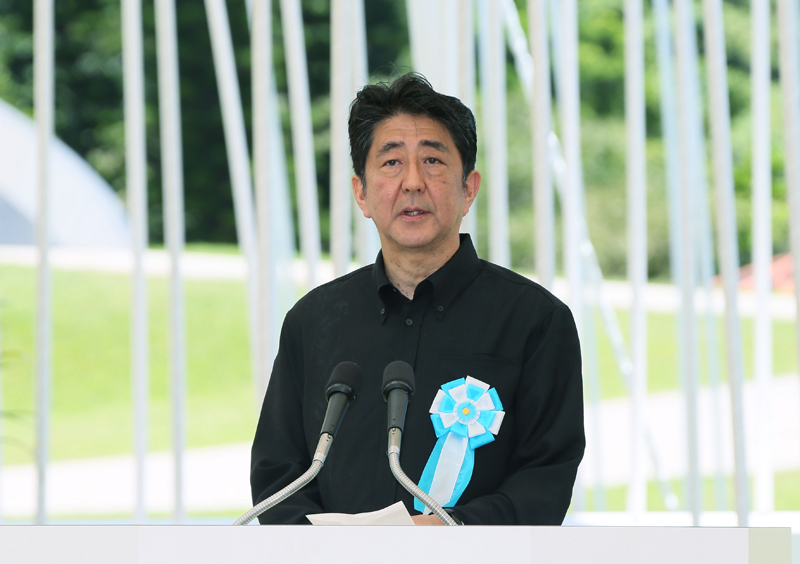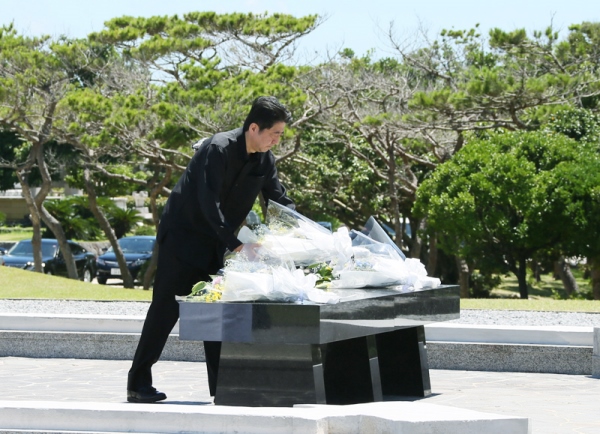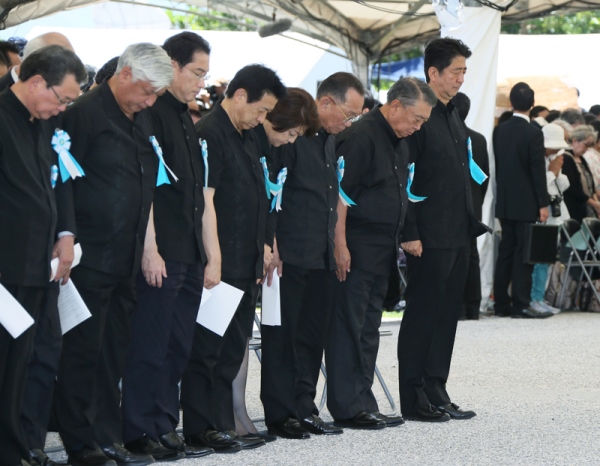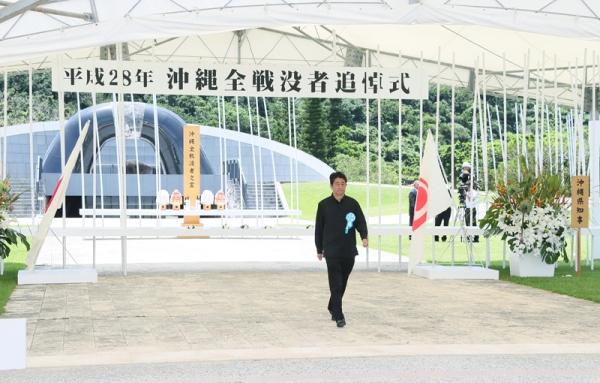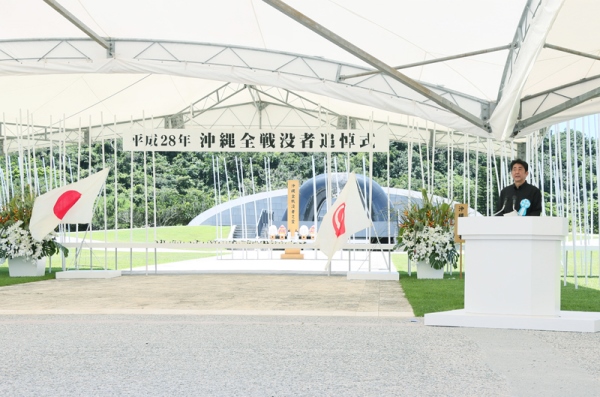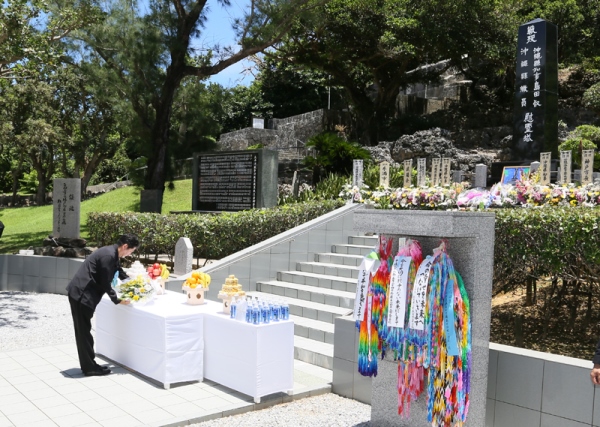Home > News > The Prime Minister in Action > June 2016 > Memorial Ceremony to Commemorate the Fallen on the 71st Anniversary of the End of the Battle of Okinawa
The Prime Minister in Action
Memorial Ceremony to Commemorate the Fallen on the 71st Anniversary of the End of the Battle of Okinawa
June 23, 2016
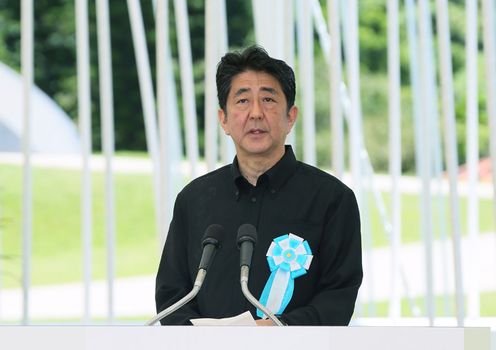
Photograph of the Prime Minister delivering an address at the Memorial Ceremony to Commemorate the Fallen on the 71st Anniversary of the End of the Battle of Okinawa (1)
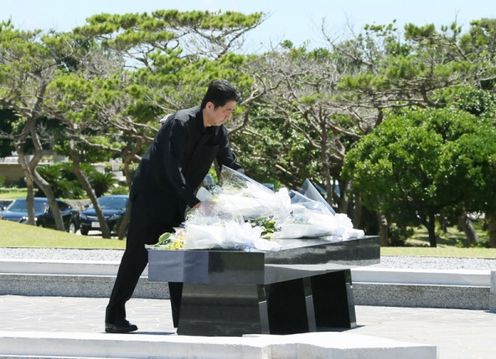
Photograph of the Prime Minister offering flowers at the National Cemetery for the War Dead
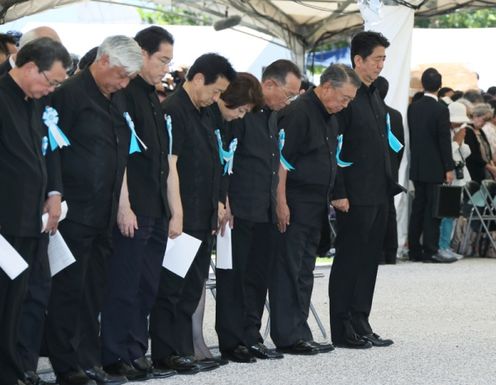
Photograph of the Prime Minister observing a minute of silence at the Memorial Ceremony to Commemorate the Fallen on the 71st Anniversary of the End of the Battle of Okinawa
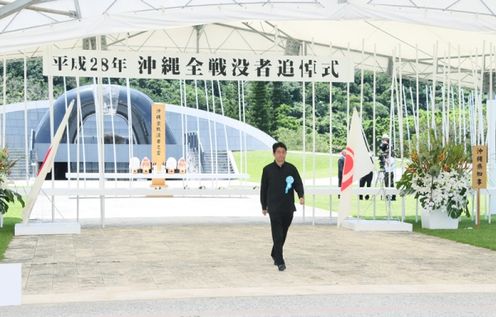
Photograph of the Prime Minister offering a flower at the Memorial Ceremony to Commemorate the Fallen on the 71st Anniversary of the End of the Battle of Okinawa
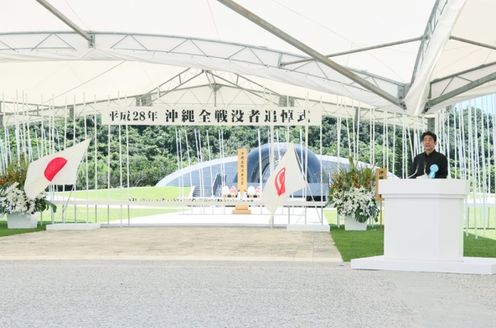
Photograph of the Prime Minister delivering an address at the Memorial Ceremony to Commemorate the Fallen on the 71st Anniversary of the End of the Battle of Okinawa (2)
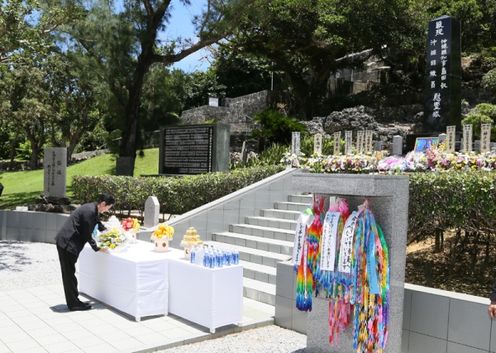
Photograph of the Prime Minister offering flowers at the Shimamori Monument
[Provisional Translation]
Prime Minister Shinzo Abe attended the Memorial Ceremony to Commemorate the Fallen on the 71st Anniversary of the End of the Battle of Okinawa, held in Okinawa Prefecture.
The Prime Minister offered flowers at the National Cemetery for the War Dead in Okinawa, and then during the memorial ceremony held at the Peace Memorial Park, observed a minute of silence at noon. Following this, the Prime Minister offered a flower and delivered an address.
Finally, the Prime Minister offered flowers at the Shimamori Monument.
After offering the flowers, the Prime Minister was asked a question by a reporter about the incident involving a person related to the U.S.
forces and in response the Prime Minister said,
“I felt strong indignation over the incident, which was a self-centered and absolutely despicable crime. During my recent summit meeting with President Obama I spoke to him about this matter and directly conveyed that this incident caused a huge shock to the entire nation. I lodged a strong protest over the incident and sought strict actions. I believe that we must sincerely consider the feelings of the people of Okinawa Prefecture, which they have expressed in various forms to date. The deterrence provided by the U.S. forces in Japan is essential for protecting the peace and security of Japan, and I believe the impact of this must be borne by the Japanese people as a whole. I intend to make steady progress with relocating 9,000 U.S. Marines outside of Japan and exert my full efforts toward alleviating the impact on Okinawa. As for the Japan-U.S. Status of Forces Agreement (SOFA), incremental improvements have been made in response to various issues over the years. Since the Abe administration took office, however, we have effectively revised the SOFA, by, for example, concluding the Agreement to Supplement the Japan-U.S. SOFA on Environmental Stewardship. In the case of this incident, it does not make sense that the arrested suspect is protected and safeguarded as part of the civilian component of the SOFA. We have agreed with the United States to revise the handling of the civilian component under the SOFA. I intend to produce results while carefully taking the feelings of the people of Okinawa into account.”
The Prime Minister was also asked a question about the relocation of Marine Corps Air Station (MCAS) Futenma, and the Prime Minister responded as follows,
“It is not acceptable that, even now, 71 years after the end of the war, Okinawa is still bearing the heavy impact of the bases. A settlement has been reached regarding MCAS Futenma according to the mutual agreement between the national government and Okinawa Prefecture. We will now respond sincerely in accordance with the settlement terms. I believe this is all there is to it. It is essential that we do not allow Futenma Air Station to remain indefinitely at its current location, which is surrounded by residential buildings and schools. I believe the national government and Okinawa Prefecture share the same understanding in this regard. I will make continuous efforts to achieve the full return of MCAS Futenma as soon as possible. I also believe it is important for the national government and Okinawa Prefecture to work together to alleviate the impact of the bases. Based on such a mindset, I intend to work towards achieving an amicable resolution.”

